Prolepsis
Paper in Peer-Reviewed Academic Journal 'Res Rhetorica' Features Research by Scott M. Graffius on the Lifespan (Half-Life) of Social Media Posts
10 May 2024
BY SCOTT M. GRAFFIUS | ScottGraffius.com
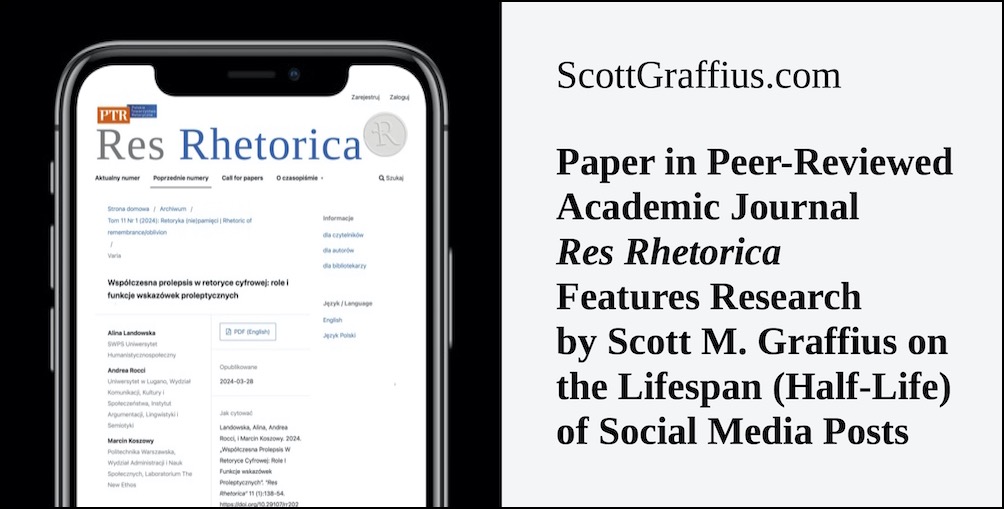

‘Contemporary Prolepsis in Digital Rhetoric: The Roles and Functions of Proleptic Cues’ paper in peer-reviewed academic journal Res Rhetorica features Scott M. Graffius’ ‘Lifespan (Half-Life) of Social Media Posts’ research.

When content is published online, relevance and engagement have a limited lifespan. An advantageous objective metric is half-life. It’s the time it takes for a post to receive half of its total engagement (such as likes, shares, and comments). Data can help inform strategic and tactical decisions, such as the frequency and scheduling of posts.
However, reports by others on the shelf life of social media are often outdated or based on the experience of one person, one organization, or one limited set of data. With any of those common limitations, findings are at risk of being non-representative, inaccurate, or unreliable.
It’s important to have a large dataset from multiple sources. In addition to generating results that are more likely to be appropriately representative, accurate, and reliable, this approach provides a more complete picture and helps identify trends.
In 2018, Scott M. Graffius first published data on the average lifespan (half-life) of posts on Snapchat, X (formerly Twitter), Facebook, Instagram, LinkedIn, YouTube, Pinterest, and blogs — based on data from multiple sources. Algorithms and other factors on platforms change over time. For that reason, Graffius periodically updates the analysis. The current (2024) edition of his ‘Lifespan (Half-Life) of Social Media Posts’ is here.
Scientists, researchers, journalists, academics, YouTubers, podcasters, SEO experts, analysts, businesses, government agencies, and others have featured and used Graffius’ research. Res Rhetorica was added to the list.
Here's the citation:
Landowska, A., Rocci, A., & Koszowy, M. (2024, April 3). Contemporary Prolepsis in Digital Rhetoric: The Roles and Functions of Proleptic Cues. Res Rhetorica, 11 (1): 138-154. DOI: https://doi.org/10.29107/rr2024.1.10.
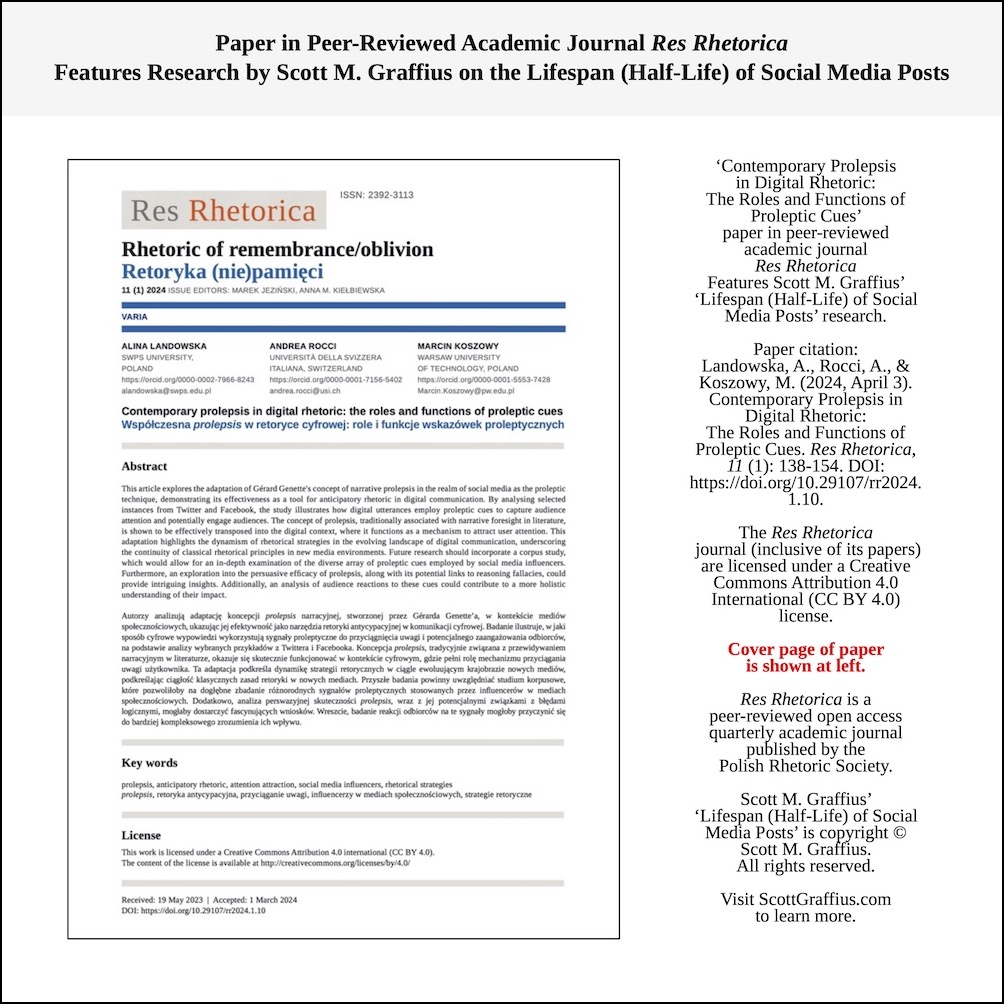
The cover image is shown above.
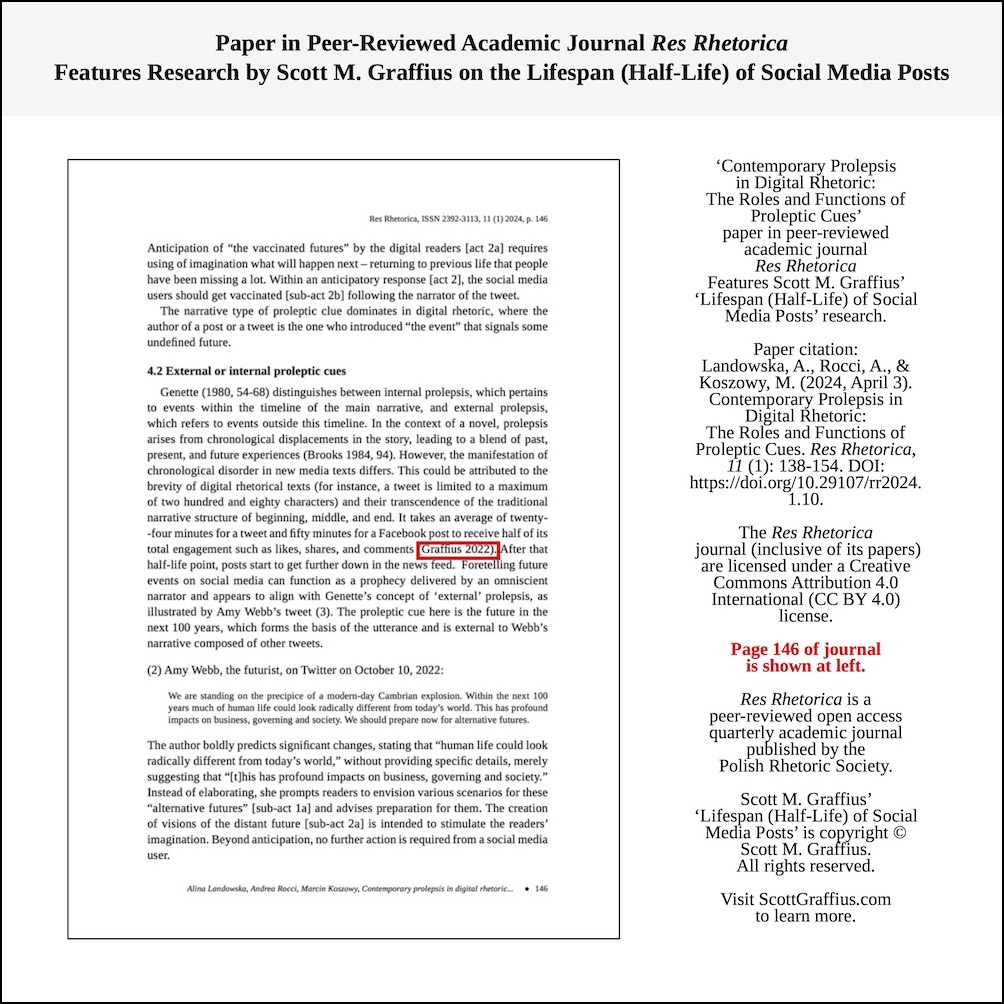
Page 146 is shown above.
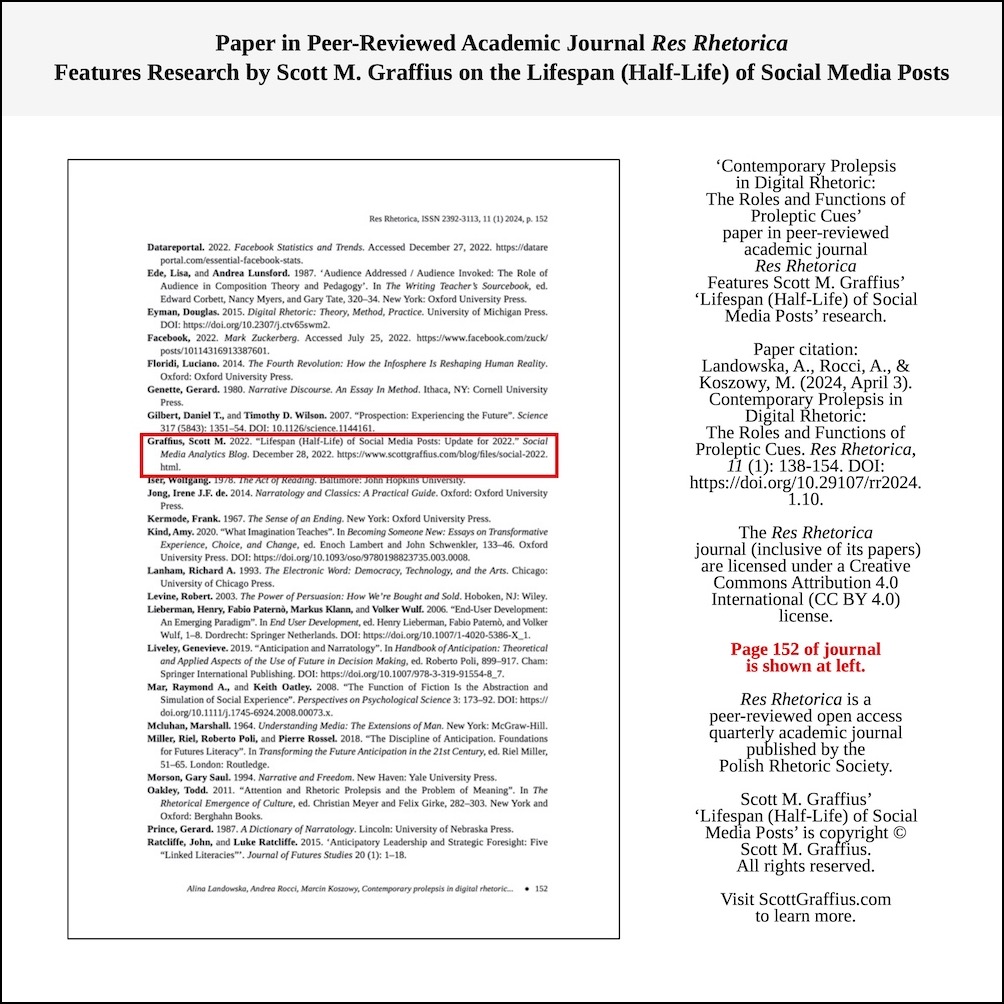
Page 152 is shown above.
About the Journal
The following includes information from https://resrhetorica.com/index.php/RR/about.
Res Rhetorica is a peer-reviewed open access quarterly academic journal associated with the Polish Rhetoric Society. Its scope includes both theories of rhetoric and practices of persuasive communication. It publishes original theoretical or analytic papers, as well as book reviews, notes on current developments and conferences in the field.
About the Author - Alina Landowska
The following includes information from https://english.swps.pl/alina-landowska.
Alina Landowska, Ph.D. is a cultural researcher. She teaches at SWPS University of Social Sciences and Humanities (Warsaw, Poland), and she collaborates with EMCC Poland as a mentor and executive coach. Her research interests include cultural evolution theory, humanistic management, and business ethics. Landowska has studied and carried out research at SDG Academy (UN), Tantur Ecumenical Institute in Jerusalem (University of Notre Dame, USA), the Baltic University Program (Uppsala, Sweden), and the Swedish Institute for Environmental Research (Kalmar, Sweden). She co-founded the Instytut Rozwoju (Development Institute) think-tank. She was the former Vice President of Polskie Stowarzyszenie Kobiet Biznesu (Polish Association of Women in Business). She represented Employers of Poland at the Business and Industry Advisory Committee by the Organisation for Economic Co-operation and Development.
About the Author - Andrea Rocci
The following includes information from https://resrhetorica.com/index.php/RR/article/view/757.
Andrea Rocci is professor of Language Sciences and Director of the Institute of Argumentation, Linguistics and Semiotics at the Università della Svizzera Italiana (Lugano, Switzerland). He is also Director of the Master Programme in European Studies in Investor Relations and Financial Communication (ESIR) offered jointly with Università Cattolica (Milan, Italy). He has published extensively in the fields of argumentation, pragmatics, semantics, and discourse analysis. He is co-author (with Marcel Danesi) of a textbook on global linguistics. He has directed several projects on argumentation in the contexts of journalism and communication funded by the Swiss National Science Foundation.
About the Author - Marcin Koszowy
The following includes information from https://resrhetorica.com/index.php/RR/article/view/757.
Marcin Koszowy is an associate professor and member of Laboratory of The New Ethos at the Warsaw University of Technology (Warsaw, Poland). He is a founding member of the steering board of European Conference on Argumentation, and chairs ArgDiaP organization fostering research on argumentation in Poland. His work is situated in the areas of logic, philosophy of language, pragmatics, and AI. He has published two books and over 40 papers in journals such as Argumentation, Pragmatics & Society, and Discourse & Society.




About Scott M. Graffius

Scott M. Graffius, PMP, SA, CSP-SM, CSP-PO, CSM, CSPO, ITIL, LSSGB is an agile project management practitioner, consultant, thinker, creator, multi-award-winning author, and international public speaker. Founder and CEO of Exceptional PPM and PMO Solutions™ and subsidiary Exceptional Agility™, he has generated over $1.9 billion for Global Fortune 500 businesses and other organizations he has served. Graffius and content from his books, talks, workshops, and more have been featured and used by Microsoft, Oracle, Broadcom, Cisco, Gartner, Project Management Institute, IEEE, National Academy of Sciences, United States Department of Energy, Yale University, Tufts University, and others. He delights audiences with dynamic and engaging talks and workshops on agile project management, AI, Tech leadership, video game development, strategic alignment, the science of high performance teams, and more. To date, he's presented sessions at 90 conferences and other events across 25 countries.
His full bio is available here.
Connect with Scott on:

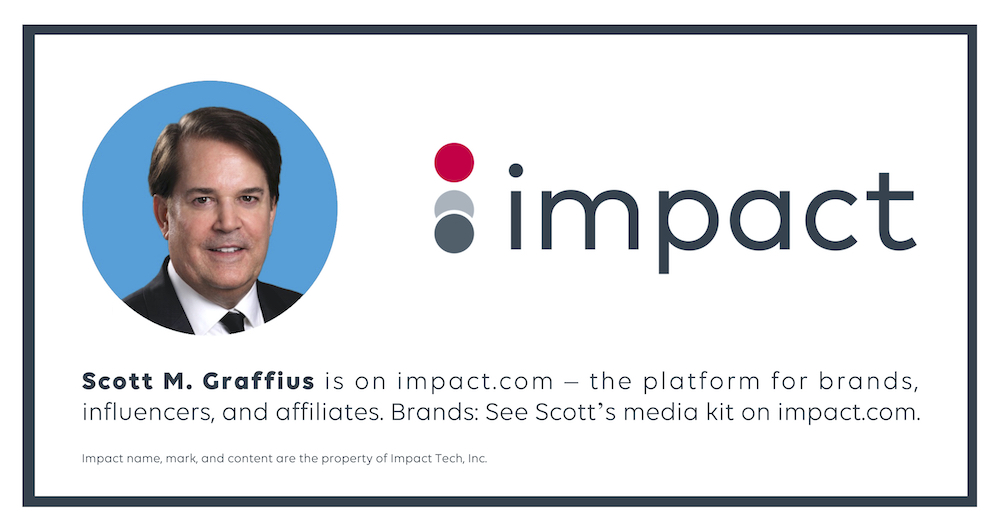

About Agile Scrum: Your Quick Start Guide with Step-by-Step Instructions
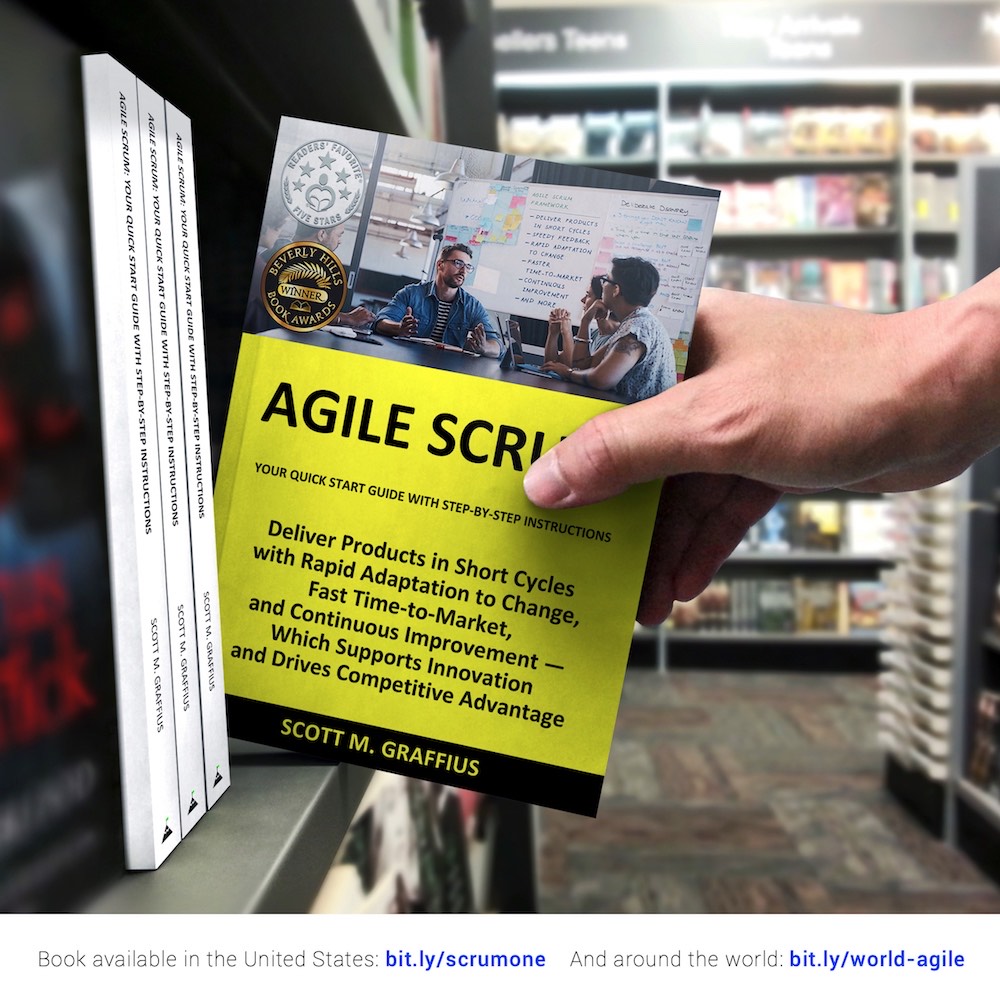
Shifting customer needs are common in today's marketplace. Businesses must be adaptive and responsive to change while delivering an exceptional customer experience to be competitive.
There are a variety of frameworks supporting the development of products and services, and most approaches fall into one of two broad categories: traditional or agile. Traditional practices such as waterfall engage sequential development, while agile involves iterative and incremental deliverables. Organizations are increasingly embracing agile to manage projects, and best meet their business needs of rapid response to change, fast delivery speed, and more.
With clear and easy to follow step-by-step instructions, Scott M. Graffius's award-winning Agile Scrum: Your Quick Start Guide with Step-by-Step Instructions helps the reader:
Hailed by Literary Titan as “the book highlights the versatility of Scrum beautifully.”
Winner of 17 first place awards.
Agile Scrum: Your Quick Start Guide with Step-by-Step Instructions is available in paperback and ebook/Kindle in the United States and around the world. Some links by country follow.

About Agile Transformation: A Brief Story of How an Entertainment Company Developed New Capabilities and Unlocked Business Agility to Thrive in an Era of Rapid Change
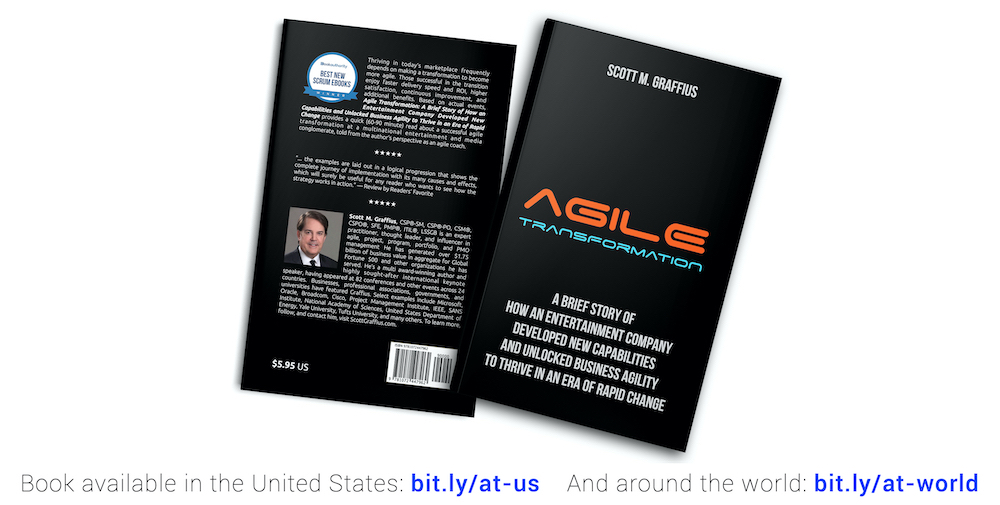
Thriving in today's marketplace frequently depends on making a transformation to become more agile. Those successful in the transition enjoy faster delivery speed and ROI, higher satisfaction, continuous improvement, and additional benefits.
Based on actual events, Agile Transformation: A Brief Story of How an Entertainment Company Developed New Capabilities and Unlocked Business Agility to Thrive in an Era of Rapid Change provides a quick (60-90 minute) read about a successful agile transformation at a multinational entertainment and media company, told from the author's perspective as an agile coach.
The award-winning book by Scott M. Graffius is available in paperback and ebook/Kindle in the United States and around the world. Some links by country follow.

DOI: 10.13140/RG.2.2.30862.57924
© Copyright 2024 Scott M. Graffius. All rights reserved. This material may not be published, broadcast, rewritten or redistributed without the express written permission of Scott M. Graffius.



‘Contemporary Prolepsis in Digital Rhetoric: The Roles and Functions of Proleptic Cues’ paper in peer-reviewed academic journal Res Rhetorica features Scott M. Graffius’ ‘Lifespan (Half-Life) of Social Media Posts’ research.

When content is published online, relevance and engagement have a limited lifespan. An advantageous objective metric is half-life. It’s the time it takes for a post to receive half of its total engagement (such as likes, shares, and comments). Data can help inform strategic and tactical decisions, such as the frequency and scheduling of posts.
However, reports by others on the shelf life of social media are often outdated or based on the experience of one person, one organization, or one limited set of data. With any of those common limitations, findings are at risk of being non-representative, inaccurate, or unreliable.
It’s important to have a large dataset from multiple sources. In addition to generating results that are more likely to be appropriately representative, accurate, and reliable, this approach provides a more complete picture and helps identify trends.
In 2018, Scott M. Graffius first published data on the average lifespan (half-life) of posts on Snapchat, X (formerly Twitter), Facebook, Instagram, LinkedIn, YouTube, Pinterest, and blogs — based on data from multiple sources. Algorithms and other factors on platforms change over time. For that reason, Graffius periodically updates the analysis. The current (2024) edition of his ‘Lifespan (Half-Life) of Social Media Posts’ is here.
Scientists, researchers, journalists, academics, YouTubers, podcasters, SEO experts, analysts, businesses, government agencies, and others have featured and used Graffius’ research. Res Rhetorica was added to the list.
Here's the citation:
Landowska, A., Rocci, A., & Koszowy, M. (2024, April 3). Contemporary Prolepsis in Digital Rhetoric: The Roles and Functions of Proleptic Cues. Res Rhetorica, 11 (1): 138-154. DOI: https://doi.org/10.29107/rr2024.1.10.

The cover image is shown above.

Page 146 is shown above.

Page 152 is shown above.
About the Journal
The following includes information from https://resrhetorica.com/index.php/RR/about.
Res Rhetorica is a peer-reviewed open access quarterly academic journal associated with the Polish Rhetoric Society. Its scope includes both theories of rhetoric and practices of persuasive communication. It publishes original theoretical or analytic papers, as well as book reviews, notes on current developments and conferences in the field.
About the Author - Alina Landowska
The following includes information from https://english.swps.pl/alina-landowska.
Alina Landowska, Ph.D. is a cultural researcher. She teaches at SWPS University of Social Sciences and Humanities (Warsaw, Poland), and she collaborates with EMCC Poland as a mentor and executive coach. Her research interests include cultural evolution theory, humanistic management, and business ethics. Landowska has studied and carried out research at SDG Academy (UN), Tantur Ecumenical Institute in Jerusalem (University of Notre Dame, USA), the Baltic University Program (Uppsala, Sweden), and the Swedish Institute for Environmental Research (Kalmar, Sweden). She co-founded the Instytut Rozwoju (Development Institute) think-tank. She was the former Vice President of Polskie Stowarzyszenie Kobiet Biznesu (Polish Association of Women in Business). She represented Employers of Poland at the Business and Industry Advisory Committee by the Organisation for Economic Co-operation and Development.
About the Author - Andrea Rocci
The following includes information from https://resrhetorica.com/index.php/RR/article/view/757.
Andrea Rocci is professor of Language Sciences and Director of the Institute of Argumentation, Linguistics and Semiotics at the Università della Svizzera Italiana (Lugano, Switzerland). He is also Director of the Master Programme in European Studies in Investor Relations and Financial Communication (ESIR) offered jointly with Università Cattolica (Milan, Italy). He has published extensively in the fields of argumentation, pragmatics, semantics, and discourse analysis. He is co-author (with Marcel Danesi) of a textbook on global linguistics. He has directed several projects on argumentation in the contexts of journalism and communication funded by the Swiss National Science Foundation.
About the Author - Marcin Koszowy
The following includes information from https://resrhetorica.com/index.php/RR/article/view/757.
Marcin Koszowy is an associate professor and member of Laboratory of The New Ethos at the Warsaw University of Technology (Warsaw, Poland). He is a founding member of the steering board of European Conference on Argumentation, and chairs ArgDiaP organization fostering research on argumentation in Poland. His work is situated in the areas of logic, philosophy of language, pragmatics, and AI. He has published two books and over 40 papers in journals such as Argumentation, Pragmatics & Society, and Discourse & Society.




About Scott M. Graffius

Scott M. Graffius, PMP, SA, CSP-SM, CSP-PO, CSM, CSPO, ITIL, LSSGB is an agile project management practitioner, consultant, thinker, creator, multi-award-winning author, and international public speaker. Founder and CEO of Exceptional PPM and PMO Solutions™ and subsidiary Exceptional Agility™, he has generated over $1.9 billion for Global Fortune 500 businesses and other organizations he has served. Graffius and content from his books, talks, workshops, and more have been featured and used by Microsoft, Oracle, Broadcom, Cisco, Gartner, Project Management Institute, IEEE, National Academy of Sciences, United States Department of Energy, Yale University, Tufts University, and others. He delights audiences with dynamic and engaging talks and workshops on agile project management, AI, Tech leadership, video game development, strategic alignment, the science of high performance teams, and more. To date, he's presented sessions at 90 conferences and other events across 25 countries.
His full bio is available here.
Connect with Scott on:



About Agile Scrum: Your Quick Start Guide with Step-by-Step Instructions

Shifting customer needs are common in today's marketplace. Businesses must be adaptive and responsive to change while delivering an exceptional customer experience to be competitive.
There are a variety of frameworks supporting the development of products and services, and most approaches fall into one of two broad categories: traditional or agile. Traditional practices such as waterfall engage sequential development, while agile involves iterative and incremental deliverables. Organizations are increasingly embracing agile to manage projects, and best meet their business needs of rapid response to change, fast delivery speed, and more.
With clear and easy to follow step-by-step instructions, Scott M. Graffius's award-winning Agile Scrum: Your Quick Start Guide with Step-by-Step Instructions helps the reader:
- Implement and use the most popular agile framework―Scrum;
- Deliver products in short cycles with rapid adaptation to change, fast time-to-market, and continuous improvement; and
- Support innovation and drive competitive advantage.
Hailed by Literary Titan as “the book highlights the versatility of Scrum beautifully.”
Winner of 17 first place awards.
Agile Scrum: Your Quick Start Guide with Step-by-Step Instructions is available in paperback and ebook/Kindle in the United States and around the world. Some links by country follow.
- 🇧🇷 Brazil
- 🇨🇦 Canada
- 🇨🇿 Czech Republic
- 🇩🇰 Denmark
- 🇫🇮 Finland
- 🇫🇷 France
- 🇩🇪 Germany
- 🇬🇷 Greece
- 🇭🇺 Hungary
- 🇮🇳 India
- 🇮🇪 Ireland
- 🇮🇱 Israel
- 🇮🇹 Italy
- 🇯🇵 Japan
- 🇱🇺 Luxembourg
- 🇲🇽 Mexico
- 🇳🇱 Netherlands
- 🇳🇿 New Zealand
- 🇳🇴 Norway
- 🇪🇸 Spain
- 🇸🇪 Sweden
- 🇨🇭 Switzerland
- 🇦🇪 UAE
- 🇬🇧 United Kingdom
- 🇺🇸 United States

About Agile Transformation: A Brief Story of How an Entertainment Company Developed New Capabilities and Unlocked Business Agility to Thrive in an Era of Rapid Change

Thriving in today's marketplace frequently depends on making a transformation to become more agile. Those successful in the transition enjoy faster delivery speed and ROI, higher satisfaction, continuous improvement, and additional benefits.
Based on actual events, Agile Transformation: A Brief Story of How an Entertainment Company Developed New Capabilities and Unlocked Business Agility to Thrive in an Era of Rapid Change provides a quick (60-90 minute) read about a successful agile transformation at a multinational entertainment and media company, told from the author's perspective as an agile coach.
The award-winning book by Scott M. Graffius is available in paperback and ebook/Kindle in the United States and around the world. Some links by country follow.
- 🇦🇺 Australia
- 🇦🇹 Austria
- 🇧🇷 Brazil
- 🇨🇦 Canada
- 🇨🇿 Czech Republic
- 🇩🇰 Denmark
- 🇫🇮 Finland
- 🇫🇷 France
- 🇩🇪 Germany
- 🇬🇷 Greece
- 🇮🇳 India
- 🇮🇪 Ireland
- 🇯🇵 Japan
- 🇱🇺 Luxembourg
- 🇲🇽 Mexico
- 🇳🇱 Netherlands
- 🇳🇿 New Zealand
- 🇪🇸 Spain
- 🇸🇪 Sweden
- 🇨🇭 Switzerland
- 🇦🇪 United Arab Emirates
- 🇬🇧 United Kingdom
- 🇺🇸 United States

DOI: 10.13140/RG.2.2.30862.57924
© Copyright 2024 Scott M. Graffius. All rights reserved. This material may not be published, broadcast, rewritten or redistributed without the express written permission of Scott M. Graffius.

